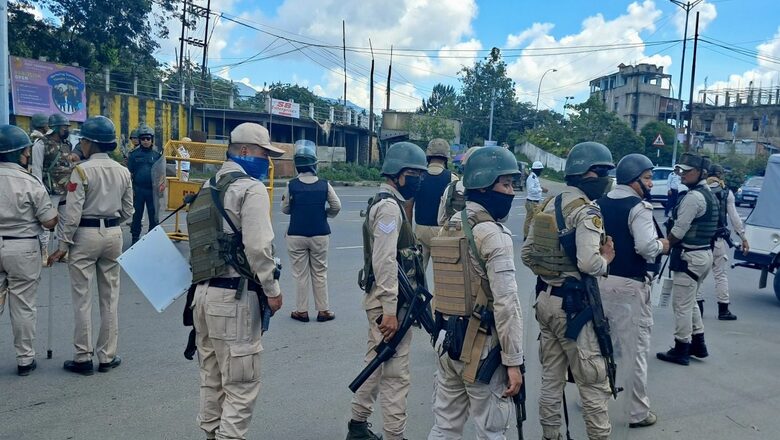
views
Manipur is a strategically important state located at the gateway to Southeast Asia, comprising the economically well-developed ASEAN grouping. It is a state with immense potential for agriculture, tourism and trade. Manipur prides itself on highly talented and spirited human resources who contribute more than the state’s share of sportspersons towards the national teams, be it boxing, weightlifting or other disciplines. Its geographical location, extremely pleasant weather throughout the year and enabling terrain make it ideal for all-round development, especially tourism.
However, any development in a state needs a peaceful and enabling security environment. The demarcation between external and internal security challenges is fast eroding. Cross-border ethnic affiliations and the cocktail of drugs and terrorism in an inhospitable border terrain make the environment even more volatile.
Northeast India shares almost 5500 km of international border/Line of Actual Control (LAC) with neighbouring countries which accounts for almost 30 per cent of India’s borders. It is also interesting to note that the entire Northeast India is connected to the rest of the country through just 23 km of Siliguri Corridor, thus highlighting the importance of borders and connect with the neighbouring countries. To realise the full economic potential arising out of the strategic location of India’s Northeast, especially Manipur, there is an inescapable requirement for elaborate infrastructure to match these aspirations.
The spread of drug trade in the region from the ‘Golden Triangle’ comprising Thailand, Myanmar and Laos is a big challenge to the administration in a border state like Manipur. The state comprises just .91 per cent of India’s population but accounts for 23.1 per cent of the country’s HIV cases due to intravenous consumption of drugs. There are almost 30,000 drug addicts in the state. In July 2022, Assam Rifles confiscated drugs worth Rs 1610 crore which clearly indicates the magnitude of the drug menace.
There are about 30 insurgent groups belonging to various ethnic groups operating in Manipur. Considering the volatility of the situation, narco-terrorism is one of the biggest challenges which adversely affects development. Sometimes, the security situation is so unstable that the writ of the state does not run against the dictates of the insurgents. Extortion from all segments of the population, including the government servants, is a reality. Insurgency suits militants and sometimes even the administration because they are no longer held accountable for inefficiency and corruption due to the prevailing insurgency situation. This vicious cycle of violence, corruption and lack of accountability takes a heavy toll on economic development and implementation of citizens’ welfare schemes.
There is a need to regulate trade and human movement, along the 1643 km long Indo-Myanmar porous border. Difficult and inaccessible terrain makes construction and maintenance of border fencing extremely challenging. An unmanned border fence has no effectiveness in such a terrain. Better fencing employing improved technology will result in the economy of human resources and ensure effective surveillance to counter infiltration. On August 9, 2023, Union Home Minister Amit Shah observed that the influx of migrants from Myanmar has created ethnic tensions amongst various communities.
The home minister has announced plans to install an advanced smart fence along a 100 km long border near Moreh on the Indo-Myanmar border. This advanced smart fencing will facilitate the security forces and the administration in a big way because Manipur has been accounting for almost 65 per cent of insurgency-related incidents in Northeast India as per the MHA data. The smart fence will include a laser-based intruder alarm system along with surveillance systems. When integrated into the command-and-control system, it will create situational awareness resulting in efficiency and effectiveness of the security forces.
The biggest security for the citizens is the implementation of the rule of law. Law-abiding citizens feel secure only when the security forces are so effective that criminals and terrorists do not affect their day-to-day functioning and they can take part in legitimate economic and other activities. Therefore, besides the employment of high-tech gadgets and fences, the administration needs to take care of the human angle. There is a need to win the ‘hearts and minds’ of the people so that they become stakeholders in the development and act as eyes and ears of the security forces to prevent law and order violations, including terrorist incidents.
Manipur is the launch pad to India’s Act East Policy but turmoil in Myanmar due to the military coup and related problems makes trade through Myanmar to the other ASEAN countries very difficult. The lack of infrastructure and the absence of industry in Manipur makes trade between India and ASEAN countries through the land route unviable. Some effort has been made to give access to the Bay of Bengal through Myanmar but it will take time to make these projects operational. To make trade economically viable, there is a need to cut the cost of logistics by encouraging manufacturing in Manipur and neighbouring Northeastern states like Nagaland, Mizoram and Assam.
In order to realise the full potential of Manipur, it is imperative to ensure a peaceful environment for which, firstly, all measures must be adopted to minimise illegal infiltration through effective fencing and making citizens of border areas stakeholders. Secondly, the security forces must conduct intelligence-based targeted operations so that the youth are no longer motivated to join militancy. Thirdly, the administration must go all guns blazing against the drug mafia and the insurgent drug mafia nexus. Fourthly, youth must be rehabilitated through skill development and job creation to wean them away from violence and terrorism.
The key to the success of the above measures lies in ‘implementation’ for which there is a need to have political will and efficient administrative machinery.
Lt Gen Balbir Singh Sandhu (Retd) was head of Army Service Corps. He is a distinguished fellow at United Service Institution of India. The views expressed in this article are those of the author and do not represent the stand of this publication. Views expressed in the above piece are personal and solely that of the author. They do not necessarily reflect News18’s views.




















Comments
0 comment